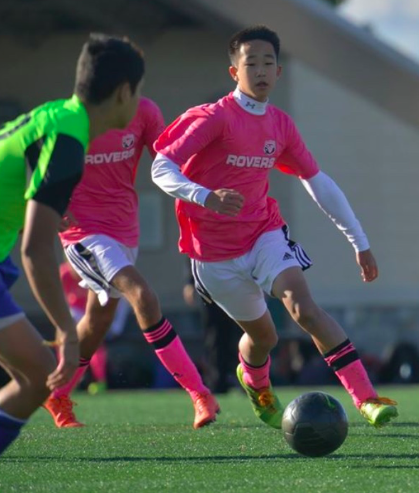Student athletes balance travel sports and school

Senior David Yoon runs up the field while playing soccer for his Herndon based travel team.
December 12, 2016
For many student athletes, the routine of getting up before dawn every weekend and driving for hours to play in a travel sport tournament can become monotonous. Travel sports have nonetheless exploded in the last 10 years, drawing athletes from every sport and giving them the opportunity to play at a higher level outside of high school and into the off-season.
However, the extreme time commitment some elite travel teams require can cause stress for student athletes who also need to balance school work, clubs and other school-sponsored sports.
“It’s difficult to play both travel and high school soccer,” David Yoon, senior and varsity soccer player, who also plays for Herndon Travel Soccer, said. “Sometimes I’d go straight from school to varsity practice, eat a quick dinner and then drive to Herndon for my travel practice.”
When travel and high school seasons overlap, it can cause almost unmanageable scheduling conflicts and immense strain on student athletes.
“I wake up at 4 a.m. every morning and drive to George Mason University for a two-hour club swim practice,” Lauren Young, sophomore and varsity swimmer, who also competes with the Mason Makos club team, said. “Then I go to school, and if one of my high school sports, [either field hockey, lacrosse or swim], is in season, I go there for another two-hour practice.”
However, some high schoolers insist that the daily practices bring a welcome distraction from the anxiety of school.
“I think volleyball gives me an [important break] from school,” Celie Feighery, sophomore and varsity volleyball player who also is on the Metro Volleyball of D.C. travel team, said. “Which is good because I’m not just focusing on school all the time.”
Although in some instances playing on a travel team isn’t necessary for making a varsity level school team, many high school coaches encourage playing travel. Some believe the more experience an athlete has competing at harder levels, the better he or she will be.
“I think if someone wants to get good playing time on a varsity sport, they should play travel,” Yoon said. “The mere exposure to a high level of competition that playing travel gives is pretty important.”
Athletes who play their sport year-round on a travel team have a distinctive edge over others when the high school season comes around.
“Swimming for a club team definitely gives me an advantage during the high school season,” Young said. “Just having the experience of swimming in higher level meets is really helpful.”
Travel sports also give athletes who want to play in college a vital lead over their competition. The tournaments that most travel teams compete in are designed to draw in college coaches and showcase the individual players.
“There’s a lot of pressure to play in college,” freshman baseball player Connor Enders said. “My brother [Jared Enders, Class of 2016] went Division I for college baseball [at College of the Holy Cross], and I’m trying to follow his path and it’s [hard].”
However, as travel participation rises, so does the competition to get recruited by colleges.
“It’s basically survival of the fittest,” Feighery said. “As you get older, the competition just shoots through the roof and it’s ridiculously crazy.”
Though the recruiting process is stressful, it also encourages student athletes to achieve good grades and participate in other extracurricular activities besides their sport. A major part of the recruiting process is making sure the athlete meets the grade requirements of the college where they want to play.
“Good grades are essential for the recruiting process,” Enders said.
Travel coaches know the major effect grades have on whether or not an athlete can continue to play in college, so they support their players’ schoolwork and extracurricular activities.
“Coaches are pretty understanding if I need to skip a practice for schoolwork,” Yoon said. “But if I had to miss the practice before a game, I probably wouldn’t play as much.”
Despite the massive time commitment travel sports entail and the pressure they sometimes cause, many athletes appreciate the opportunity to play on their travel teams.
“I enjoy playing on a travel team because of the competition and the teammates,” Enders said.

